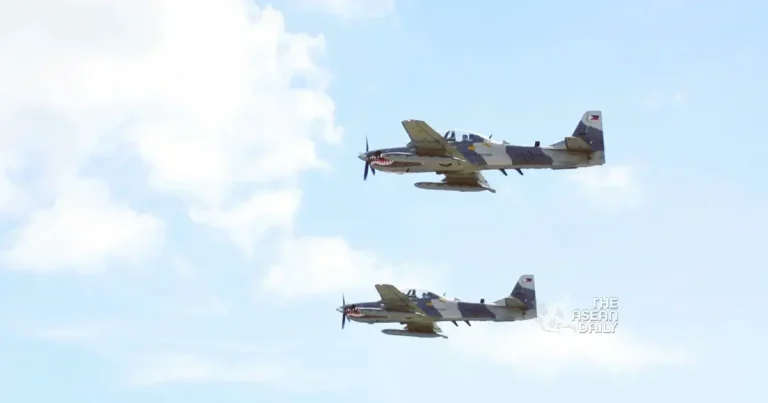27-11-2023 (MANILA) Aircraft from China’s People’s Liberation Army (PLA) reportedly shadowed Philippine aircraft during joint Philippine-Australia drills in the West Philippine Sea (WPS) over the weekend, according to Armed Forces of the Philippines (AFP) Chief General Romeo Brawner Jr.
General Brawner confirmed that the Chinese jets circled an A-29B Super Tucano from the Philippine Air Force, marking the only significant incident during the joint exercises. He clarified that the shadowing occurred as the Philippine aircraft flew near Hubo Reef.
Despite the presence of the Chinese jets, the Super Tucano successfully completed its air and maritime patrol mission as planned.
The AFP’s Public Affairs Office chief, Colonel Xerxes Trinidad, confirmed that two Chinese fighter jets were observed orbiting the Philippine A-29B Super Tucano near Hubo Reef. He further stated that the Philippine aircraft continued its flight without any untoward incidents.
General Brawner emphasized that the joint patrols with allies and partners, such as Australia, are conducted to uphold the rules-based international order and abide by international laws like the United Nations Convention on the Law of the Sea (UNCLOS).
In a separate development, the United States Navy destroyer USS Hopper conducted a freedom of navigation operation in the South China Sea (SCS) near the Paracel Islands, according to the US Indo-Pacific Command (USINDOPACON). The operation aimed to assert navigational rights and freedoms consistent with international law.
Upon completion of the operation, the USS Hopper exited the excessive claim area and continued its operations in the SCS. USINDOPACON stated that the freedom of navigation operation upheld the rights, freedoms, and lawful uses of the sea as recognized by international law. It challenged the restrictions on innocent passage imposed by the People’s Republic of China, Taiwan, and Vietnam.
China, Vietnam, and Taiwan each claim sovereignty over the Paracel Islands and require authorization or advance notification for military vessels passing through their territorial sea. This requirement violates international law, which grants the right of innocent passage to all ships, including warships, through a territorial sea.
The US emphasized that the imposition of such restrictions is unlawful and conducted the operation without prior notification to or permission from the claimants, demonstrating that innocent passage is not subject to such limitations.
Unlawful and extensive maritime claims in the South China Sea pose a significant threat to freedom of the seas, including navigation, trade, and economic opportunities for countries in the region. The United States, regardless of the claimant’s identity, challenges excessive maritime claims worldwide. It aims to protect the rights and freedoms guaranteed to all nations under customary international law and the UNCLOS.
The US reiterated its commitment to preserving the freedom of the seas, which is vital for global security, stability, and prosperity. It upholds the principle of freedom of navigation for all nations and will continue to defend these rights and freedoms, rejecting intimidation or coercion.
Meanwhile, the Japan Coast Guard (JCG) representatives observed a five-day towing and water cannon exercise conducted by the Philippine Coast Guard (PCG) from November 20 to November 24. The exercise, held in the waters near Lamao, Bataan, involved the PCG’s two multi-role response vessels, BRP Teresa Magbanua and BRP Malabrigo.
During the exercise, the PCG demonstrated proper handling of emergency towing gear, selection of the correct towing line, and accurate throwing of tow lines. The exercise also included test protocols and capability demonstrations to address maritime threats, such as fire at sea scenarios.
Safety measures were strictly observed, ensuring compliance with the International Safety Management Code and the International Regulations for Preventing Collisions at Sea: Rules of the Road (1972).




